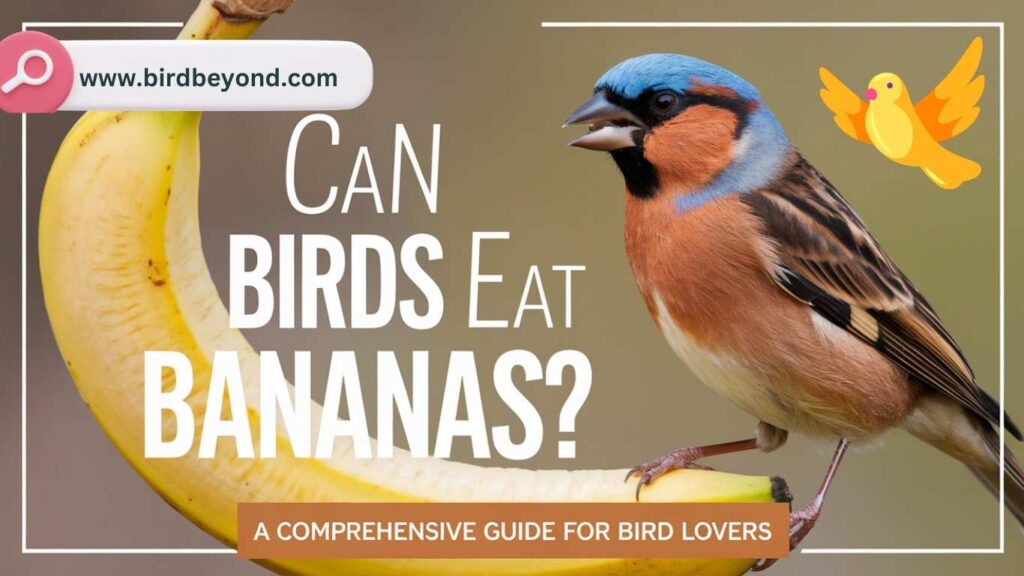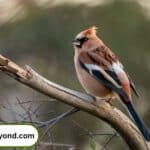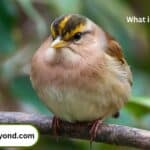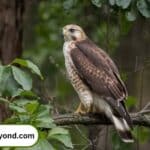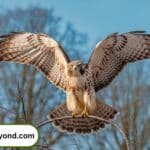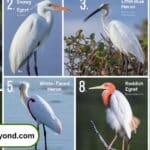Bird enthusiasts often wonder: Can birds eat bananas? As we observe birds enjoy a variety of seeds, grains, and insects, it’s only natural to ask if fruits like bananas can be a part of their diet. The answer is a resounding yes! Many species of birds love bananas and benefit from the rich nutrients they provide. In this blog, we’ll explore which birds eat bananas, how to serve them, and why bananas can be a valuable addition to your bird-feeding routine.
Nutritional Value of Bananas for Birds
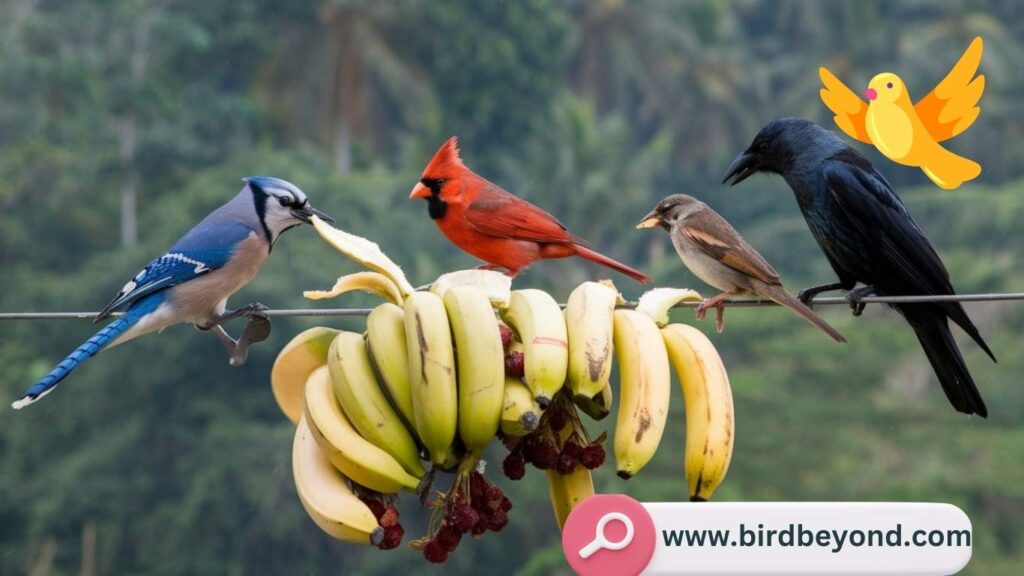
Understanding the banana nutritional value for birds is key before offering them to your feathered friends. Bananas are packed with essential nutrients that provide energy, support healthy metabolism, and contribute to overall well-being. Here’s a breakdown of the core nutrients in bananas and how they benefit birds:
| Nutrient | Benefit for Birds |
|---|---|
| Vitamin B6 | Supports nerve function and metabolism |
| Vitamin C | Boosts immune system and tissue repair |
| Potassium | Regulates fluids, heart function |
| Fiber | Aids digestion, prevents constipation |
| Natural Sugars | Quick energy source |
| Antioxidants | Reduces oxidative stress |
Potential Benefits
- Energy Boost: The natural sugars in bananas (glucose, fructose, and sucrose) provide a quick energy boost, making bananas ideal for active birds like Blue Jays and Starlings.
- Digestive Aid: With plenty of fiber, bananas can help regulate digestion, especially in birds that may struggle with certain types of seeds or grains.
- Mineral Support: Potassium helps regulate fluid balance, heart function, and nerve signals in birds, which is essential for maintaining overall health.
Potential Drawbacks
While bananas are safe, moderation is key. Birds eating bananas in excess may consume too much sugar, which can lead to weight gain and other health issues. Additionally, wild birds don’t rely on fruits alone, so a balanced diet that includes seeds, grains, and insects is vital for their survival.
Birds That Love Eating Bananas
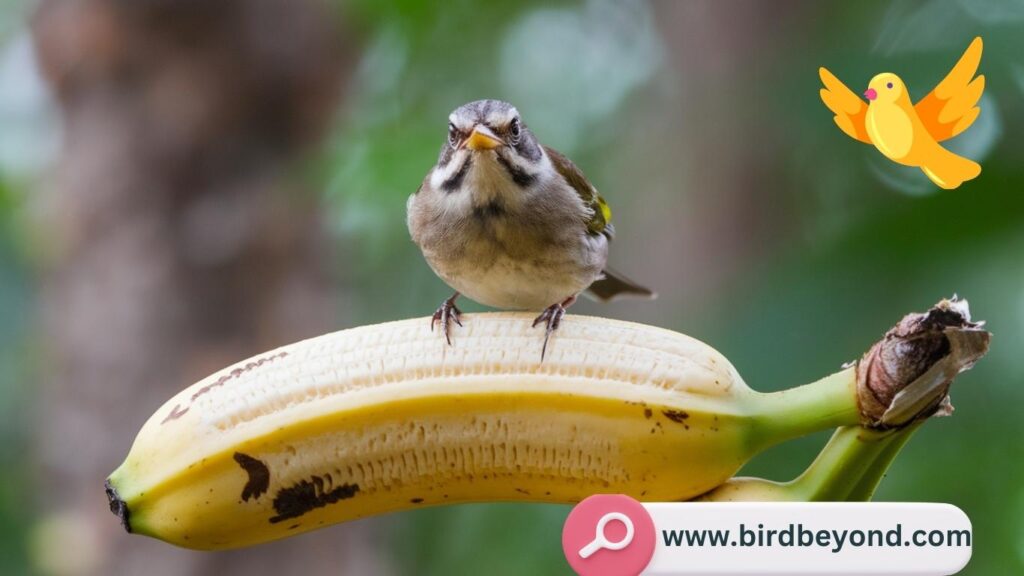
Birds that enjoy eating fruits are known as frugivores. These fruit-eating birds, often found in tropical and subtropical regions, enjoy bananas as part of their diet. However, many backyard birds also love bananas.
Parrots and Bananas
Parrots are known for their diverse diet, which includes seeds, nuts, and fruits. Bananas are a great source of energy for parrots due to their high sugar content. Not only are bananas safe, but they’re often a favorite treat among pet and wild parrots alike.
Orioles and Bananas
Orioles are another species that thrive on fruit. Bananas, in particular, attract orioles to bird feeders. These birds, known for their vibrant orange plumage, are often seen enjoying soft fruits like bananas, making it an ideal treat to lure them into your garden.
Blue Jays Eating Bananas
Blue Jays, common backyard birds in North America, are omnivores. They eat insects, seeds, nuts, and fruits. Bananas offer a sweet treat that Blue Jays will gladly accept, especially when other food sources are scarce during the colder months.
Northern Mockingbirds and Fruit
Northern Mockingbirds are known to have varied diets that include insects and fruit. Can Birds Eat Bananas are an excellent addition to their fruit intake. Feeding these birds bananas can help supplement their diet during migration or in urban areas where natural food sources are limited.
Robins Eating Bananas
Robins are often seen feeding on worms and insects, but they’re also fruit-eating birds. Bananas can provide a sweet and nutritious snack for robins, particularly during the winter months when insects are harder to find.
Starlings and Bananas
Starlings, known for their adaptability, will happily feast on bananas. These birds often thrive in urban environments and love soft fruits. Offering bananas can attract starlings to your backyard feeders.
Other Birds Attracted by Bananas
Beyond the species listed above, other birds such as finches, tanagers, and thrushes also enjoy the occasional banana snack. This versatile fruit is a favorite among many fruit-eating birds, making it a great choice to offer at your feeders.
How to Serve Bananas to Birds
When feeding birds bananas, presentation matters. Here are some effective ways to offer this nutritious fruit to attract more birds to your backyard:
Best Methods to Serve Bananas
- Sliced Bananas: Slicing bananas into small pieces makes it easier for birds to peck at and digest. Slices also fit nicely into most bird feeders.
- Mashed Bananas: For smaller birds or species that prefer soft foods, mashing bananas into a pulp can make it more accessible. Simply place the mashed banana in a shallow dish or on a platform feeder.
- Whole Bananas: Some larger birds like parrots or blue jays will enjoy pecking at a whole banana. Just be sure to secure the banana in a feeder to prevent it from rolling away.
- Banana Skewers: Thread banana chunks onto a skewer and hang it from a branch or a feeder to attract fruit-loving birds like orioles or robins.
Creating a Bird Feeder for Bananas
If you want to get creative, you can make a dedicated bird feeder for fruits like bananas. Use simple materials like mesh bags, skewers, or shallow trays. A bird feeder banana slices can be as simple as placing the fruit in a designated spot where birds can easily access it.
Here’s a quick guide for a DIY banana bird feeder:
- Take a shallow dish or platform feeder.
- Place small banana chunks or slices inside.
- Hang it in a visible area where birds frequent, preferably away from direct sunlight to prevent spoilage.
How Much Banana is Enough?
Since bananas are high in sugar, moderation is important. Offer small pieces once or twice a week as a treat. For larger species like parrots, half a banana is usually enough, while smaller birds like finches or orioles only need a few small slices.
Can Birds Eat Banana Peels?
Now that we know birds love bananas, the next question is: Can birds eat banana peels? While banana peels are technically edible, they’re not the most digestible part of the fruit. The thick, fibrous texture of peels can be difficult for birds to process.
Nutritional Value of Banana Peels for Birds
Banana peels contain fiber, antioxidants, and even trace amounts of potassium, but they lack the softness and sweetness that birds prefer. However, some birds, especially larger species, may peck at peels if they’re hungry.
Potential Risks of Feeding Banana Peels
The biggest concern with feeding banana peels to Can Birds Eat Bananas is the presence of pesticides. Unless the bananas are organic, the peels could carry harmful chemicals that can negatively impact birds’ health.
Safe Practices for offering banana peels to birds:
- Use organic bananas: If you plan to offer banana peels, ensure they are from organic sources.
- Wash thoroughly: Wash the peel under running water to remove any surface contaminants.
- Cut into smaller pieces: Make it easier for birds to nibble on by cutting the peel into small, manageable pieces.
If you want to play it safe, you’re better off sticking to the banana fruit and discarding the peel.
Bananas as Part of a Balanced Bird Diet
While bananas are a great occasional treat, it’s important to remember that birds need a balanced diet. Frugivores (fruit-eating birds) can handle a higher intake of fruits like bananas, but for most species, fruits should only make up a small portion of their overall diet.
Complementary Foods
- Seeds and Grains: Provide energy and essential fats. Consider adding sunflower seeds or millet.
- Insects and Worms: A great protein source for birds like robins and mockingbirds.
- Other Fruits: Apples, grapes, and oranges can also be offered alongside bananas to provide variety.
Balanced Diet Example for Backyard Birds
| Food Type | Ideal Serving Frequency |
|---|---|
| Seeds & Grains | Daily |
| Insects & Worms | 2-3 times per week |
| Fruits (including bananas) | 2-3 times per week |
A healthy mix of seeds, grains, insects, and fruit will ensure birds receive all the necessary nutrients to thrive.
Common Myths and Misconceptions
As with any popular bird-feeding practice, there are a few myths surrounding feeding birds bananas. Let’s clear up some of the most common misconceptions:
- Myth: Bananas are too sugary for birds. While bananas do contain natural sugars, these are not harmful when offered in moderation. Birds are highly active and burn off energy quickly, so a bit of sugar from fruit won’t harm them.
- Myth: Birds only eat seeds and insects. Many birds, especially frugivores, eat fruit in the wild. Offering bananas mimics their natural diet.
- Myth: Bananas attract unwanted pests. While it’s true that fruit can attract pests like ants or squirrels, this is easily managed by cleaning up any uneaten fruit at the end of the day and using proper feeder designs.
Final Thoughts on Feeding Birds Bananas
Bananas are a nutritious and tasty treat for many bird species, from Blue Jays to *Northern Mockingbirds* and even parrots. The key to successful feeding is to offer bananas in moderation as part of a varied diet. Whether you’re slicing bananas for a feeder or mashing them up for smaller birds, this fruit can enhance your bird-feeding efforts and attract new species to your backyard.
Feeding birds fruit like bananas, apples, and oranges can provide essential nutrients and energy, especially during migration or breeding seasons. However, always be mindful of how much you’re offering to avoid disrupting the birds’ natural diet.

William Henry is a distinguished blogger with a flair for avian storytelling. With a wealth of experience, he delivers captivating insights and expert knowledge to Bird Beyond. William’s passion for birds and his engaging writing style make him a standout voice in the birdwatching community, offering readers both valuable information and delightful narratives.

